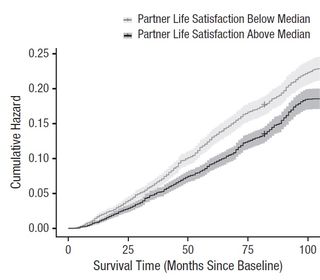Happiness
Happy Wife = Long Life?
New research indicates that having a happy spouse is associated with longevity.
Posted March 28, 2019

We’ve all heard the adage, Happy wife, happy life. It turns out it may be true: A study led by a Rutgers University researcher found that a husband’s life satisfaction tended to be greater when his wife described their marriage as a happy one.
But let's take this adage one step further and ask a more intriguing question: Can having a happy spouse (regardless of gender) not only lead to a happier life but a longer one as well? That is the question a researcher from the Netherlands recently set out to answer. In this study, social psychologist Olga Stavrova examined a nationally representative sample that included more than 4,000 married couples age 50 or older. The couples were followed for up to eight years and measured in terms of a range of psychological and physical variables. (Not all of the participants survived those eight years, so any deaths that occurred during the study’s duration were also recorded.)
The first notable result was this: The life satisfaction of one's spouse was associated with a significantly reduced risk of dying. Put simply, people with happy spouses — those who would strongly agree with the statement “I am satisfied with my life” — lived longer than people with unhappy spouses. Importantly, this result held regardless of the individual’s gender, ethnicity, education level, household income, or sexual orientation.

This figure shows that as time went by, people with an unhappy spouse (the top line) showed an increase in the risk of death steeper than that of people with a happy spouse (the bottom line). So just as a good diet, a healthy weight, and regular exercise protect you against premature death, it is possible that a happy spouse does too.
You may be thinking, Why? Why would having a happy spouse be associated with a reduced risk of dying?
There are probably several explanations. It could be that when our spouse is happy, they are more likely to take care of us, especially in times of illness. Or it could be that when our spouse is happy, they are less likely to fight with us and so they reduce our stress.
A third possibility, one the researchers examined in this study, is that happy people are simply more physically active. And the more active our partner is, the more active we are as well. In the end, the results supported this conclusion: Happy people engaged in more vigorous physical activity, which in turn was associated with their spouses being more active, which in turn was associated with their spouses having a lower likelihood of death.
It is important to keep in mind that this study was entirely correlational. That means that although spousal happiness and mortality were found to be related, we can’t say for sure that the former caused the latter. There may be some yet-to-be-examined variable that causes both spousal happiness and decreased mortality. However, this study did include a number of features that bolster a causal explanation, including the fact that it was longitudinal, the fact that reverse causality (i.e., mortality causing earlier spousal happiness) is not logically possible, and the fact that it did assess a possible causal mechanism (it examined physical activity as a mediator). This study was the first of its kind and more research is needed, but the initial results are intriguing.
So here is the takeaway point: The next time you have an opportunity to make your spouse happy—maybe by surprising them with a gift or giving them a back rub without them having to ask, or supporting their dreams and aspirations—do it. Not only will it benefit your partner, but it may also provide you with benefits as well. The same goes for your partner: Relationships, after all, are a two-way street. Consider forwarding this article to your spouse as a not-so-subtle reminder.


